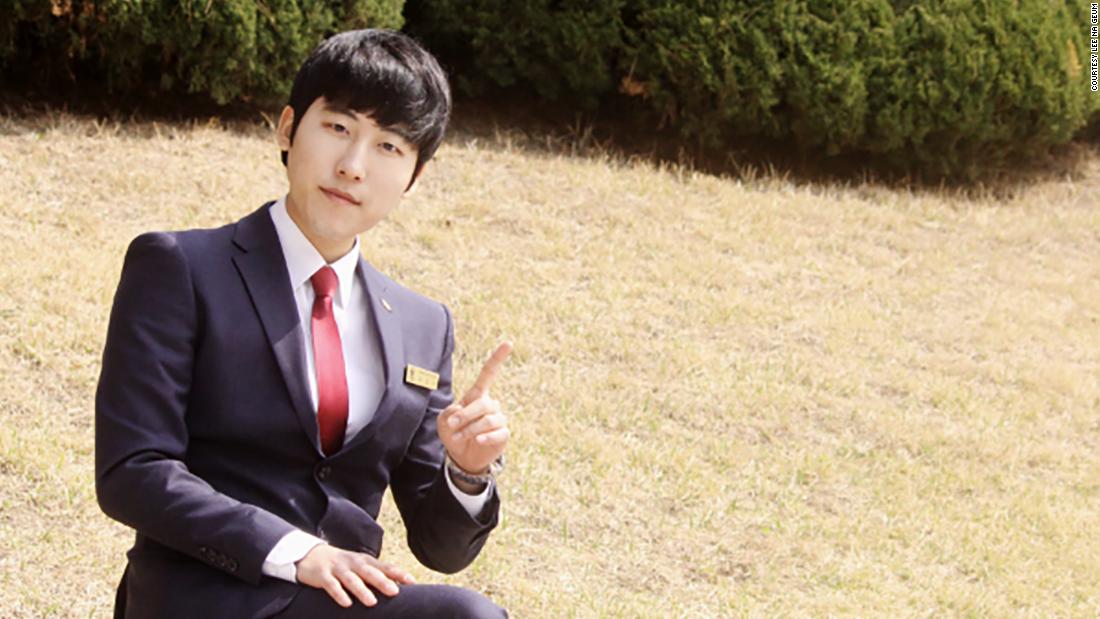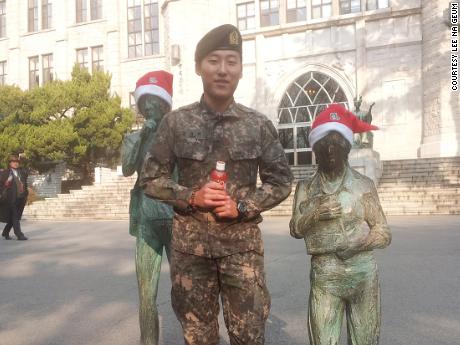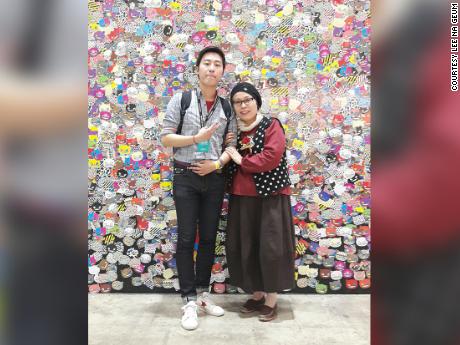Kwon's family say he was the victim of a "ghost doctor," the name given to someone who performs a surgery another surgeon was hired for when the patient is under general anesthetic.
The practice is illegal in South Korea, but activists say weak regulations in the country's booming
$10.7 billion-dollar plastic surgery industry have allowed factory-like clinics, where unqualified staff substitute for surgeons, to thrive. Doctors sometimes simultaneously conduct multiple operations -- meaning they rely on substitutes who may be freshly qualified plastic surgeons, dentists, nurses, or, in some cases, medical equipment sales people -- to undertake some of the work for them.
Under South Korean law, someone who orders or performs an unlicensed medical act is subject to a maximum punishment of five years in prison or a maximum fine of 50 million won ($44,000). If a ghost surgery is performed by a licensed doctor, that could lead to charges of causing harm or fraud. But these crimes are hard to prove -- many substitute doctors don't note down the work they've done and many clinics don't have CCTV cameras. And even once the cases get to court, ghost doctors rarely get heavy penalties, which emboldens clinics to continue with the practice, lawyers say.
But Kwon's high-profile case has brought renewed attention to shadowy operators. His family aren't only bringing criminal charges against the doctors involved -- they're demanding legal changes, too.
Kwon was a warm and humble university student, the kind of son who cooked seaweed soup for his mother's birthday, his family remembers. He was a high-achiever but was insecure about his looks and believed plastic surgery could make him more successful, his brother said.
In photos taken shortly before his death, Kwon had digitally altered his face to have the sort of pointy, V-like jaw seen on many K-pop idols.
Kwon's elder brother and mother, Lee Na Geum, tried to talk him out of getting plastic surgery, but Kwon secretly booked into a well-known clinic that specialized in jawline surgeries in the glitzy Seoul neighborhood of Gangnam, an area traditionally home to the country's biggest K-pop labels.
On September 8, 2016, a doctor removed bone to change the shape of Kwon's jawline, a popular surgery in East Asia that usually takes one to two hours. It cost 6.5 million won ($5,766), according to his mother.
But Kwon's operation did not go as planned.
After bleeding excessively, he was moved to hospital. At 9 a.m. the next morning, the plastic surgeon who had operated on Kwon arrived at the hospital. He told Kwon's family that the procedure had gone as normal and even offered CCTV footage of the operating room to prove it -- something that isn't required nationwide, but which some clinics do to increase trust. "I immediately felt that I needed that evidence," said Kwon's mother, Lee.
Lee watched the CCTV footage from the operating room 500 times, she says. The footage showed the surgery started at 12:56 p.m. when the plastic surgeon began to cut Kwon's jaw bone. Three nursing assistants were also in the room.
After an hour, the plastic surgeon left, and another doctor entered the operating room. The two entered and left the room, but for almost 30 minutes, there was no doctor in the operating room at all, although nursing assistants were present.
Lee saw that although the surgeon Kwon hired cut his jaw bones, he did not complete the surgery. Much of rest of the operation was done by the other doctor -- a general doctor who did not have a plastic surgery license and who had recently graduated from medical school, despite an advertisement for the clinic explicitly saying that the head doctor of the clinic would operate from start to finish.
"My brother trusted in that main doctor, and that's why he decided to be operated on there."Kwon Tae-hoon
"My brother trusted in that main doctor, and that's why he decided to be operated on there," Kwon Tae-hoon said.
The surgery finally finished at 4:17 p.m., more than three hours after it started, according to the footage. Jaw surgery usually takes an hour-and-a-half or less for an experienced doctor, according to Kim Seon-woong, the former law director of the Korean Association of Plastic Surgeons, who has run a plastic surgery clinic for 25 years.
After the surgery, both Kwon's doctors went home, leaving nurses in charge as he lost blood. Lee said she was shocked by the footage; as her son bled, assistants corrected their makeup or looked at their cellphones. In total, they mopped the bloody floor 13 times. When medical professionals evaluated the footage, they found he had likely lost three times as much blood as what the doctors had said.
"I don't think this ghost doctor checked how much blood my son shed," she added. "I was so angry at that fact. Had just one of the three doctors checked how much he bled," she said, referring to the plastic surgeon, the ghost doctor and the anesthetist, "but no one did."
Despite Kwon's death, the clinic stayed open and continued to advertize that it had gone 14 years without a patient experiencing any accident. The clinic closed last year. It is unclear why.
A lack of laws
Kwon's family wanted to hold those responsible to account. But they soon found the laws around ghost doctors were weak and incomplete.
South Korea's Supreme Court approved plastic surgery for aesthetic purposes as a medical practice in 1974, and the following year surgeons
were required to pass professional exams.
By 2014, officials were aware of the practice of ghost surgeries. In 2015, a group of plastic surgeons asked the Ministry of Health and Welfare to tighten rules by requiring doctors to say who operated on a procedure, and installing CCTV cameras in the clinics.
Civic groups began monitoring ghost surgeries, Korean broadcaster SBS
reported at the time, and the Korean Plastic Surgeons Association formed a special task force team to look into the ghost doctor practice. In 2018, the law changed to raise the penalties for doctors who instruct ghost surgeries. But a
paper published in 2018 in medical journal Annals of Surgical Treatment and Research found the practice was still "rampant."
One surgeon, who CNN agreed not to name as he feared that speaking out could prompt legal repercussions, said he began working at one of the country's largest plastic surgeries in 2012. He no longer works there, but is speaking out because he doesn't want to live with the guilt.
He said he was often asked to perform surgeries for the main doctor, and described how substitutes waited in a basement until they were called to operate on patients. These people were not listed as employees on the clinic's website, and the clinic presented the surgeries as conducted by respected surgeons, he said.
Many of the face-shaping surgeries -- like the one Kwon had -- were performed by substitutes, mainly dentists, at the clinic where he worked, the surgeon said.
Onlookers agree the practice happens for a simple reason: profit. South Korea has the highest rate of plastic surgery per capita, according to a
paper last year in medical journal Aesthetic Plastic Surgery. Before Covid-19 hit, South Korea attracted
thousands of plastic surgery tourists annually. In the capital alone, there are 561 plastic surgery clinics, according to the Korean Statistics Office.
Jo Elfving-Hwang, an associate professor of Korean Studies at the University of Western Australia, said high-profile surgeons often use K-pop stars or celebrities to promote their clinic. But during busy periods, some can't deal with the volume of patients, especially as star doctors also need to be available for consultations with new customers, said Elfving-Hwang.
"That's where those instances have arisen," she said.
Ghost doctors are a way for clinics to maximize profits by getting another doctor to cover the star practitioner -- even if it's not legal. "I guess the reason why this practice is around is because young and inexperienced doctors can get jobs and gain experience, and clinics can operate at a lower cost by hiring them to perform," said the unnamed plastic surgeon. "In this way, clinics can take in more patients and conduct more surgeries."
Not all surgeries performed by ghost doctors result in injuries, but between 2016 to 2020, 226 people were injured, had side effects, required resurgery or died during plastic surgery, according to the Korea Consumer Agency, which did not specify which proportion had died or how. Some people who have died following plastic surgery include international travelers drawn to South Korea for plastic surgery,
including a Chinese customer and a
Hong Kong heiress, although it's unclear if these cases are included in the statistics.
Patients may not be aware they have been operated on by a ghost doctor. Ghost doctors may not note their involvement in the surgery on medical charts, and many operating rooms don't have cameras. That makes any charge difficult to prove, according to Park Ho-kyun, a lawyer representing Kwon's family.
If victims are aware, they may be unwilling to come forward, as they may feel ashamed, Elfving-Hwang said. If victims do take legal cases, they often settle out of court, which means signing a confidentiality clause if they receive compensation, according to the unnamed plastic surgeon.
"Since ghost surgery or substituted surgery occurs secretly, it is very difficult to find out the statistics or the current situation."Health Ministry senior deputy director Park Jae-woo
It's unclear how many cases make it to court. But after cases are prosecuted in court, the Ministry of Health and Welfare can impose additional suspensions on doctors. A total of 28 administrative dispositions were imposed on doctors who ordered substituted surgery from 2015 to 2019, according to Ministry of Health and Welfare data provided by ruling party lawmaker Kwon Chil-seung's office. Five lost their licenses, and the rest had their licenses temporarily suspended.
One doctor who asked a nurse to perform eyelid or nose plastic surgeries at least 90 times received only a three-month suspension, according to ruling party lawmaker Kwon Chil-seung's office. Another doctor who ordered a medical device company employee and a nurse to perform at least 58 surgeries on spinal disc patients got a three-month suspension, the office added.
"There are ongoing efforts by lawmakers to strengthen the qualification of doctors by revising the medical law and the Health Ministry has agreed with the proposed bills," Health Ministry senior deputy director Park Jae-woo told CNN this month. "Since ghost surgery or substituted surgery occurs secretly, it is very difficult to find out the statistics or the current situation."







No comments:
Post a Comment